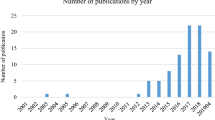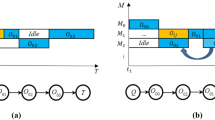Abstract
The rise of the engine remanufacturing industry has resulted in increased possibilities of energy conservation during the remanufacturing process, and scheduling could exert significant effects on the energy performance of manufacturing systems. However, only a few studies have specifically addressed energy-efficient scheduling for remanufacturing. Considering the uncertain processing time and routes and the operation characteristics of remanufacturing, we used the crankshaft as an illustrative case and built a fuzzy job-shop scheduling model to minimize the energy consumption during remanufacturing. An improved adaptive genetic algorithm was developed by using the hormone modulation mechanism to deal with the scheduling problem that simultaneously involves parallel machines, batch machines, and uncertain processing routes and time. The algorithm demonstrated superior performance in terms of optimal value, run time, and convergent generation in comparison with other algorithms. Computational results indicated that the optimal scheduling scheme is expected to generate 1.7 kW · h of energy saving for the investigated problem size. In addition, the scheme could improve the energy efficiency of the crankshaft remanufacturing process by approximately 5%. This study provides a basis for production managers to improve the sustainability of remanufacturing through energy-aware scheduling.
Similar content being viewed by others
References
Du Y, Li C. Implementing energy-saving and environmental-benign paradigm: Machine tool remanufacturing by OEMs in China. Journal of Cleaner Production, 2014, 66: 272–279
Xiang W, Ming C. Implementing extended producer responsibility: Vehicle remanufacturing in China. Journal of Cleaner Production, 2011, 19(6–7): 680–686
International Energy Agency. World Energy Outlook 2016. Paris: Organization for Economic Co-operation and Development, 2016, 284–285
Central People’s Government of China. Notification of energy conservation and emission reduction strategy for “13th Five-Year Plan” delivered by the State Council. Available at the State Council of the People’s Republic of China website, 2018-11-20
Chu H, Cao Q, Fei R. MAS-based production scheduling system for manufacturing cell-based workshop. Frontiers of Mechanical Engineering in China, 2006, 1(4): 375–380
Jiang Z, Jiang Y, Wang Y, et al. A hybrid approach of rough set and case-based reasoning to remanufacturing process planning. Journal of Intelligent Manufacturing, 2019, 30(1): 19–32
Gutowski T G, Sahni S, Boustani A, et al. Remanufacturing and energy savings. Environmental Science & Technology, 2011, 45(10): 4540–4547
Sutherland J W, Adler D P, Haapala K R, et al. A comparison of manufacturing and remanufacturing energy intensities with application to diesel engine production. CIRP Annals-Manufacturing Technology, 2008, 57(1): 5–8
Yang S S, Ngiam H Y, Ong S K, et al. The impact of automotive product remanufacturing on environmental performance. Procedia CIRP, 2015, 29: 774–779
Lage Junior M, Godinho Filho M. Master disassembly scheduling in a remanufacturing system with stochastic routings. Central European Journal of Operations Research, 2017, 25(1): 123–138
Sun H, Chen W, Liu B, et al. Economic lot scheduling problem in a remanufacturing system with returns at different quality grades. Journal of Cleaner Production, 2018, 170: 559–569
Guide V D R Jr, Srivastava R, Kraus R E. Product structure complexity and scheduling of operations in recoverable manufacturing. International Journal of Production Research, 1997, 35(11): 3179–3200
Zhang R, Ong S K, Nee A Y C. A simulation-based genetic algorithm approach for remanufacturing process planning and scheduling. Applied Soft Computing, 2015, 37: 521–532
Wen H, Liu M, Liu C, et al. Remanufacturing production planning with compensation function approximation method. Applied Mathematics and Computation, 2015, 256: 742–753
Singh P, Khan B, Vidyarthi A, et al. Energy-aware online non-clairvoyant scheduling using speed scaling with arbitrary power function. Applied Sciences, 2019, 9(7): 1467
Liu G S, Zhou Y, Yang H D. Minimizing energy consumption and tardiness penalty for fuzzy flow shop scheduling with state-dependent setup time. Journal of Cleaner Production, 2017, 147: 470–484
Shrouf F, Ordieres-Meré J, García-Sánchez A, et al. Optimizing the production scheduling of a single machine to minimize total energy consumption costs. Journal of Cleaner Production, 2014, 67: 197–207
Tang D, Dai M, Salido M A, et al. Energy-efficient dynamic scheduling for a flexible flow shop using an improved particle swarm optimization. Computers in Industry, 2016, 81: 82–95
Abdullah S, Abdolrazzagh-Nezhad M. Fuzzy job-shop scheduling problems: A review. Information Sciences, 2014, 278: 380–407
Lei D. Fuzzy job shop scheduling problem with availability constraints. Computers & Industrial Engineering, 2010, 58(4): 610–617
Sakawa M, Kubota R. Fuzzy programming for multiobjective job shop scheduling with fuzzy processing time and fuzzy duedate through genetic algorithms. European Journal of Operational Research, 2000, 120(2): 393–407
Wang S, Wang L, Xu Y, et al. An effective estimation of distribution algorithm for the flexible job-shop scheduling problem with fuzzy processing time. International Journal of Production Research, 2013, 51(12): 3778–3793
Lei D. A genetic algorithm for flexible job shop scheduling with fuzzy processing time. International Journal of Production Research, 2010, 48(10): 2995–3013
Gao K Z, Suganthan P N, Pan Q K, et al. An improved artificial bee colony algorithm for flexible job-shop scheduling problem with fuzzy processing time. Expert Systems with Applications, 2016, 65: 52–67
Geng Z, Zou Y. Study on job shop fuzzy scheduling problem based on genetic algorithm. Computer Integrated Manufacturing Systems, 2002, 8: 616–620 (in Chinese)
Sakawa M, Mori T. Efficient genetic algorithm for job-shop scheduling problems with fuzzy processing time and fuzzy duedate. Computers & Industrial Engineering, 1999, 36(2): 325–341
Lei D. Co-evolutionary genetic algorithm for fuzzy flexible job shop scheduling. Applied Soft Computing, 2012, 12(8): 2237–2245
Wang X, Chan H K. An integrated fuzzy approach for evaluating remanufacturing alternatives of a product design. Journal of Remanufacturing, 2013, 3(1): 10
Lin F T. Fuzzy job-shop scheduling based on ranking level (λ, 1) interval-valued fuzzy numbers. IEEE Transactions on Fuzzy Systems, 2002, 10(4): 510–522
Balin S. Parallel machine scheduling with fuzzy processing times using a robust genetic algorithm and simulation. Information Sciences, 2011, 181(17): 3551–3569
Zhu Q, Sarkis J, Lai K. Supply chain-based barriers for truck-engine remanufacturing in China. Transportation Research Part E: Logistics and Transportation Review, 2015, 74: 94–108
Wang X, Cao L. Genetic Algorithm and Implementation of Software Applications. Xi’an: Xi’an Jiaotong University Press, 2002, 25–39 (in Chinese)
Srinivas M, Patnaik L M. Adaptive probabilities of crossover and mutation in genetic algorithms. IEEE Transactions on Systems, Man, and Cybernetics, 1994, 24(4): 656–667
Farhy L S, Straume M, Johnson M L, et al. A construct of interactive feedback control of the GH axis in the male. American Journal of Physiology: Regulatory, Integrative and Comparative Physiology, 2001, 281(1): R38–R51
Wei L, Li X, Li Y, et al. Optimization of tandem cold rolling schedule based on improved adaptive genetic algorithm. Journal of Mechanical Engineering, 2010, 46(16): 136–141 (in Chinese)
Gonçalves J F, Resende M G C. Random-key genetic algorithms. In: Martí R, Panos P, Resende M, eds. Handbook of Heuristics. Cham: Springer, 2016, 1–13
Li M. Research on remanufactured flexible job shop scheduling based on damaged parts. Thesis for the Master’s Degree. Dalian: Dalian University of Technology, 2019, 29–30 (in Chinese)
Peng S, Li T, Zhao J, et al. Petri net-based scheduling strategy and energy modeling for the cylinder block remanufacturing under uncertainty. Robotics and Computer-integrated Manufacturing, 2019, 58: 208–219
Gong X, De Pessemier T, Joseph W, et al. A generic method for energy-efficient and energy-cost-effective production at the unit process level. Journal of Cleaner Production, 2016, 113: 508–522
Liu C, Dang F, Li W, et al. Production planning of multi-stage multi-option seru production systems with sustainable measures. Journal of Cleaner Production, 2015, 105: 285–299
Peng S, Li T, Tang Z, et al. Comparative life cycle assessment of remanufacturing cleaning technologies. Journal of Cleaner Production, 2016, 137: 475–489
Acknowledgements
The authors highly appreciate the investigation opportunities provided by SINOTRUK, Jinan Fuqiang Power Co., Ltd. We are also grateful for the financial support from the National Natural Science Foundation of China (Grant Nos. 51775086 and 51605169), and Natural Science Foundation of Guangdong Province China (Grant No. 2014A030310345).
Author information
Authors and Affiliations
Corresponding author
Rights and permissions
About this article
Cite this article
Zhao, J., Peng, S., Li, T. et al. Energy-aware fuzzy job-shop scheduling for engine remanufacturing at the multi-machine level. Front. Mech. Eng. 14, 474–488 (2019). https://doi.org/10.1007/s11465-019-0560-z
Received:
Accepted:
Published:
Issue Date:
DOI: https://doi.org/10.1007/s11465-019-0560-z




